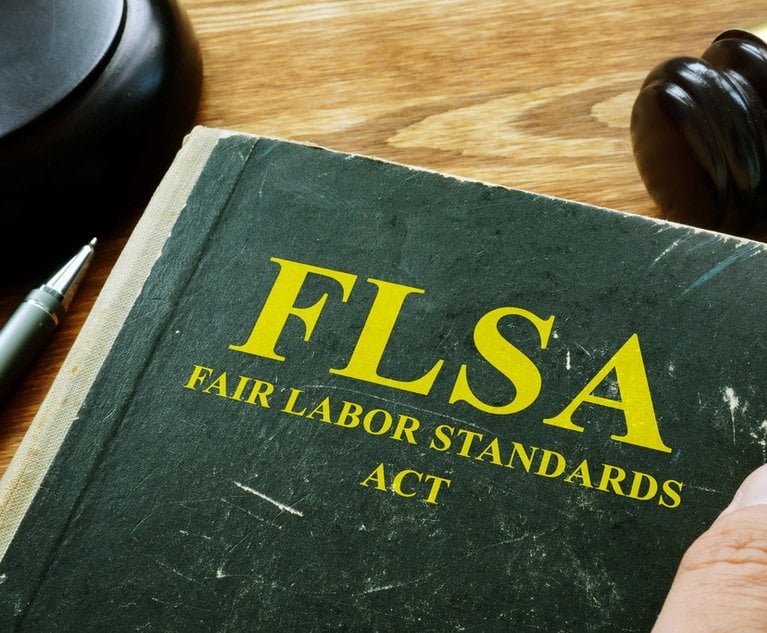 Andrea Kirshenbaum, left, and Fara Cohen, right, of Post & Schell. Courtesy photos
Andrea Kirshenbaum, left, and Fara Cohen, right, of Post & Schell. Courtesy photos Expansive View of Compensable Time Under PMWA Likely to Drive More Class Actions
This decision is the latest in a line of cases interpreting the PMWA more expansively than the federal Fair Labor Standards Act (FLSA), which already is leading to the filing of PMWA putative class action lawsuits.
September 08, 2021 at 01:39 PM
9 minute read
On July 21, the Pennsylvania Supreme Court issued a highly anticipated decision in Heimbach v. Amazon.com, answering two questions certified from the U.S. Court of Appeals for the Sixth Circuit:
- Is time spent by a nonexempt employee on an employer's premises waiting to undergo, and undergoing, mandatory security screening, compensable time under the Pennsylvania Minimum Wage Act (PMWA); and
- Does the de minimis doctrine apply to bar claims for negligible or insignificant amounts of time worked under the PMWA?
The court answered yes to the former and no to the latter, ultimately deciding that time spent on an employer's premises undergoing mandatory security screenings is compensable time under the PMWA and declining to apply the de minimis doctrine to the PMWA. This decision is the latest in a line of cases interpreting the PMWA more expansively than the federal Fair Labor Standards Act (FLSA), which already is leading to the filing of PMWA putative class action lawsuits.
History of the 'Heimbach' Case
The plaintiffs in Heimbach worked at a large Amazon warehouse in Pennsylvania and filed a class action lawsuit in 2013 alleging that they were owed wages for time spent undergoing mandatory security screenings. The employees' duties included receiving deliveries, transporting merchandise, picking up merchandise from storage locations and processing merchandise for shipping. After clocking out at the end of their shifts, the employees were required to undergo mandatory security screenings where they would have to go through metal detectors and have their bags searched. The employees were not compensated for the time they were required to wait in line for and undergo the security screenings.
This content has been archived. It is available through our partners, LexisNexis® and Bloomberg Law.
To view this content, please continue to their sites.
Not a Lexis Subscriber?
Subscribe Now
Not a Bloomberg Law Subscriber?
Subscribe Now
NOT FOR REPRINT
© 2025 ALM Global, LLC, All Rights Reserved. Request academic re-use from www.copyright.com. All other uses, submit a request to [email protected]. For more information visit Asset & Logo Licensing.
You Might Like
View All
Third Circuit's 'Johnson v. NCAA' Opinion: What It Means for College Athletics and Beyond
6 minute read
'Utterly Bewildering': GCs Struggle to Grasp Scattershot Nature of Law Firm Rate Hikes

Health Care Worker Files Class Action Against Staffing Agency for Unpaid Meal Breaks
4 minute readLaw Firms Mentioned
Trending Stories
Who Got The Work
J. Brugh Lower of Gibbons has entered an appearance for industrial equipment supplier Devco Corporation in a pending trademark infringement lawsuit. The suit, accusing the defendant of selling knock-off Graco products, was filed Dec. 18 in New Jersey District Court by Rivkin Radler on behalf of Graco Inc. and Graco Minnesota. The case, assigned to U.S. District Judge Zahid N. Quraishi, is 3:24-cv-11294, Graco Inc. et al v. Devco Corporation.
Who Got The Work
Rebecca Maller-Stein and Kent A. Yalowitz of Arnold & Porter Kaye Scholer have entered their appearances for Hanaco Venture Capital and its executives, Lior Prosor and David Frankel, in a pending securities lawsuit. The action, filed on Dec. 24 in New York Southern District Court by Zell, Aron & Co. on behalf of Goldeneye Advisors, accuses the defendants of negligently and fraudulently managing the plaintiff's $1 million investment. The case, assigned to U.S. District Judge Vernon S. Broderick, is 1:24-cv-09918, Goldeneye Advisors, LLC v. Hanaco Venture Capital, Ltd. et al.
Who Got The Work
Attorneys from A&O Shearman has stepped in as defense counsel for Toronto-Dominion Bank and other defendants in a pending securities class action. The suit, filed Dec. 11 in New York Southern District Court by Bleichmar Fonti & Auld, accuses the defendants of concealing the bank's 'pervasive' deficiencies in regards to its compliance with the Bank Secrecy Act and the quality of its anti-money laundering controls. The case, assigned to U.S. District Judge Arun Subramanian, is 1:24-cv-09445, Gonzalez v. The Toronto-Dominion Bank et al.
Who Got The Work
Crown Castle International, a Pennsylvania company providing shared communications infrastructure, has turned to Luke D. Wolf of Gordon Rees Scully Mansukhani to fend off a pending breach-of-contract lawsuit. The court action, filed Nov. 25 in Michigan Eastern District Court by Hooper Hathaway PC on behalf of The Town Residences LLC, accuses Crown Castle of failing to transfer approximately $30,000 in utility payments from T-Mobile in breach of a roof-top lease and assignment agreement. The case, assigned to U.S. District Judge Susan K. Declercq, is 2:24-cv-13131, The Town Residences LLC v. T-Mobile US, Inc. et al.
Who Got The Work
Wilfred P. Coronato and Daniel M. Schwartz of McCarter & English have stepped in as defense counsel to Electrolux Home Products Inc. in a pending product liability lawsuit. The court action, filed Nov. 26 in New York Eastern District Court by Poulos Lopiccolo PC and Nagel Rice LLP on behalf of David Stern, alleges that the defendant's refrigerators’ drawers and shelving repeatedly break and fall apart within months after purchase. The case, assigned to U.S. District Judge Joan M. Azrack, is 2:24-cv-08204, Stern v. Electrolux Home Products, Inc.
Featured Firms
Law Offices of Gary Martin Hays & Associates, P.C.
(470) 294-1674
Law Offices of Mark E. Salomone
(857) 444-6468
Smith & Hassler
(713) 739-1250






